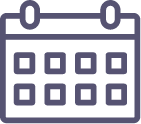Online Eating Disorder Therapy
More than therapy: A complete treatment program
Get Started
"*" indicates required fields
As effective as traditional in-person IOP treatment
Morning, midday, or evening therapy sessions
Save on travel, childcare, and other expenses
Eating disorders can range from irregular eating habits to severe distress about body weight. However, with the right support, recovery is achievable. Our online eating disorder therapy can help you reclaim your dreams and live a life brimming with joy and fulfillment.
More than therapy – we offer individual counseling, group sessions, and a dedicated recovery coach to help you overcome depression.
Comprehensive online therapy for eating disorders
Our program is designed for those looking for a comprehensive approach to treating an eating disorder—such as binge eating disorder, bulimia, or anorexia—that goes beyond a weekly therapy session. It includes a variety of components that help participants learn, connect, and get genuine support on their road to wellness.
- Group sessions: Connect with others who understand your struggle firsthand.
- Individual counseling: Our skilled counselors tailor therapy to your needs, focusing on your specific triggers and emotional responses.
- Recovery coaching: Benefit from the knowledge and support of a dedicated coach who walks alongside you throughout your recovery.
Inside our online eating disorders therapy: Modern vs other programs
Our program is intensive—involving 3 to 5 sessions per week for 4 to 6 weeks—and is just as effective as in-person programs. Here are a few features that set us apart:
- Tailored treatment plans: We apply proven, evidence-based methods while acknowledging individual differences.
- Accountability and monitoring: Our continual care, even after therapy ends, promotes long-term accountability and improvement.
- Reliable support: Our team is available at a broad range of designated hours, offering guidance and reassurance when you need it.
- Flexible schedules: Recognizing that you have a life outside therapy, we help you fit treatment around your everyday routines and responsibilities.
- Online access: Get therapy whenever and wherever it suits you.
Get specialized eating disorders therapy
Eating disorders aren’t all the same—their symptoms, effects, and intensity vary. That’s why we’ve developed specialized treatment strategies for each type. The following are common forms we treat:
- Binge eating disorder therapy: Regain control over compulsive eating habits and alleviate feelings of guilt and shame.
- Bulimia nervosa therapy: Break the harmful cycle of binge eating and purging.
- Anorexia nervosa therapy: Tackle fears of weight gain that lead to severe food restriction.
There are also other types of eating disorders. Contact us for more specific information about we can help with your unique case.
Online therapy for bulimia, anorexia, and binge eating disorder
While we employ only evidence-based eating disorders treatment methods, we understand that individuals respond differently. We’ll work to determine the methods that best help you understand your triggers and process your feelings. Here are a few common approaches used in our program:

Dialectical Behavioral Therapy (DBT)
This method develops coping skills, including mindfulness, emotional regulation, and distress tolerance.

Cognitive Behavioral Therapy (CBT)
This therapy targets harmful thinking patterns that fuel eating disorders and equips people with practical skills to cope with triggers and prevent relapses.

Interpersonal Therapy (IT)
This approach focuses on improving relationships and involving family members in the therapy process.
Beyond recovery to a fulfilling future
Your recovery from an eating disorder means more than managing symptoms; it’s an opportunity to rebuild your life toward a vibrant, rewarding future. With us, you’ll curate a personalized coping toolbox that prepares you to meet your disorder head-on. In the process, you’ll reap the following rewards:
- Deeper relationships: Enhance connections with loved ones and learn to navigate the relational challenges that eating disorders often bring.
- Rekindled passions: Rediscover the activities and interests that bring you joy, helping you build a rich and fulfilling life.
- Empowerment: Gain confidence and control, transforming your experience with an eating disorder into personal growth.
- Improved well-being: Address the physical impacts of your eating disorder to enhance your health.
We accept insurance
We work with most major insurance providers to minimize the cost of treatment. Let’s check to see if your provider will cover your treatment.

We’re in-network with Blue Cross Blue Shield
More than therapy
Our online therapy for eating disorders is more immersive and comprehensive than traditional therapy. We’ll tailor your treatment plan to improve all areas of your life that you need help with.
Few online eating disorders programs offer such comprehensive services, but we believe such support is essential to helping you achieve your goals and find happiness. Here are just a few of our additional services:
- Academic support: If you’re a student, we offer academic assistance, providing resources that help you maintain educational progress during treatment.
- Vocational training: Our vocational training programs can enhance your skills or teach you new ones, supporting a successful career trajectory.
- Aftercare/extended care: To ensure long-term recovery, we continue to provide support, even after your therapy sessions end.
- Family involvement: We encourage family participation to build a supportive environment for your ongoing recovery.
Meet our therapists
When choosing an online therapist for eating disorders, experience is important. Our therapists are all trained at the masters level and have experience helping people on online platforms.
If you have specific questions about our team, therapists, or coaches, feel free to call or send a message.
Therapy that’s private and comfortable
Therapy should be a place where you feel safe, secure, and respected. We promise the following:
- A nonjudgmental environment: Our online therapy for binge eating disorder, bulimia, anorexia, and other eating disorders is a safe space where you can express yourself without fear of judgment.
- Confidentiality: We implement strict confidentiality measures to ensure protection of all personal information.